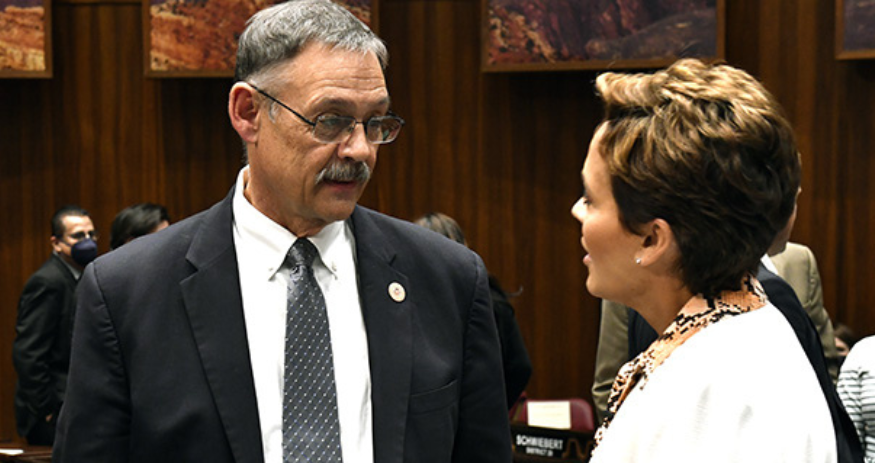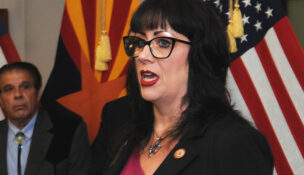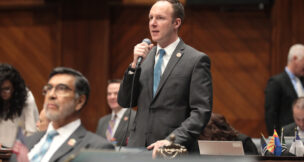AZ Supreme Court to see Lake, Hamadeh, Finchem 2022 election cases on Nov. 6
Howard Fischer, Capitol Media Services//October 28, 2024//
AZ Supreme Court to see Lake, Hamadeh, Finchem 2022 election cases on Nov. 6
Howard Fischer, Capitol Media Services//October 28, 2024//
Three Republicans who lost their 2022 election bids will finally have their cases looked at by the Arizona Supreme Court – the day after the 2024 election.
That’s the day the justices will have a closed-door conference to take one last look at 31 pending requests by those who lost at lower court levels.
And on that list are bids by Kari Lake, who lost the race for governor, Abe Hamadeh, who was not elected attorney general, and Mark Finchem, who was outpolled in his effort to be the secretary of state.
But Chief Justice Ann Scott Timmer told Capitol Media Services there is nothing at all nefarious about the scheduling. And she said there was no effort by the court to have the issues in the 2022 races decided before Nov. 5 – the day that all three are now running for different offices.
In fact, Timmer said if the challengers are unhappy with what they believe is any delay, they have only themselves to blame.
She said there is a procedure for lawyers who need a more immediate decision than the normal course of appeals.
“I assume they’ve got very good attorneys, attorney that know what they’re doing,” Timmer said.
“They know our process,” she continued. “Had they felt the need to accelerate it and to bring it to our attention they could have done it. And they didn’t.”
None of the failed 2022 candidates returned calls Monday seeking comment.
But Hamadeh – or at least, a spokeswoman for him – previously has charged the justice have “slow walked” this case.
“At no point has the court given any indication the have the urgency to see the closest race in Arizona history to get litigated,” said Erica Knight. That refers to the final tally, which shows him losing the race for attorney general to Democrat Kris Mayes by 280 votes.
And Knight said Hamadeh has been working to move on now that he is the Republican nominee for Congress in CD 8.
“Abe is committed to saving his country and doesn’t have the time to wait on certain justices to find their courage,” she said.
Hamadeh’s current case awaiting Supreme Court review – he has another at the Court of Appeals – is built around the contention that Mohave County Superior Court Judge Lee Jantzen improperly denied him more time to find evidence of what he claimed were issues with the 2022 race.
When he did find some of what he was seeking, Jantzen denied his bid for a new trial. And the Court of Appeals, in refusing to overturn Jantzen’s decision, said Hamadeh failed to show how any of that might have changed the outcome of the race he lost by 280 votes.
The claims by Lake, now mounting a bid for U.S. Senate, are similar but not identical.
She wants the justices to give her the chance to present what she claims is “new evidence” about the extent of the failure of tabulators used on Election Day two years ago.
Those claims cover everything from an alleged failure to conduct legally required “logic and accuracy” testing on tabulating machines to allegations Maricopa County had advance notice those tabulators at vote centers would reject ballots on Election Day.
That, in turn, goes to her arguments that would-be voters, frustrated by long lines, left without casting ballots. And Lake contends that a majority of those discouraged voters were Republicans, would have voted for her – and would have made up her 17,117-vote loss to Democrat Katie Hobbs.
The issue that Finchem has before the Supreme Court is different.
Finchem, now a candidate for Arizona Senate from the Prescott area, long ago gave up trying to have his loss in the race for secretary of state to Adrian Fontes.
Finchem lost by more than 120,000 votes. And a trial judge said even if his claims about machine malfunctions are true – the same one alleged by Lake – it doesn’t matter because there was no way he could make up the difference.
What that leaves for the Supreme Court to decide, however, is whether Finchem and his attorneys have to pay the $47,000 in legal fees run up by Fontes in defending the lawsuit.
Appellate Judge Samuel Thumma said the record shows there was no grounds for filing the lawsuit in the first place.
He said it also ran afoul of provisions that bar cases from be filed unless there is a “good faith belief” there is a legal basis. That, the appellate judge said, did not occur here.
Timmer, in her interview Monday with Capitol Media Services, said none of the legal issues – or the fact the cases involve people who are again candidates – played a role in scheduling.
She acknowledged that the cases have been awaiting action for awhile. The last filings in the Hamadeh cases go back to June 18; for Finchem and Lake the docket was last active in August.
But Timmer said some of the other of the 31 cases on the Nov. 6 conference go back even farther. And she said there was nothing special done in the three election cases.
“However, anyone that is certainly, I want to say, conspiracy minded or just disbelieving that people act according to a process and without any ill intent, people are going to see what they see,” she said. Timmer said, however, the fact all three election cases wound up on the Nov. 6 conference is “coincidental.”
It occurred, she said, because the staff attorneys, who she said are in short supply and overworked, simply put the calendar together that way.
Still, the chief justice said she might have interceded to advance the high-interest cases.
“Had I seen it, I probably would have done just that,” Timmer said.
“But it wasn’t brought to my attention,” she said. “And I can take the blame for that.”














































